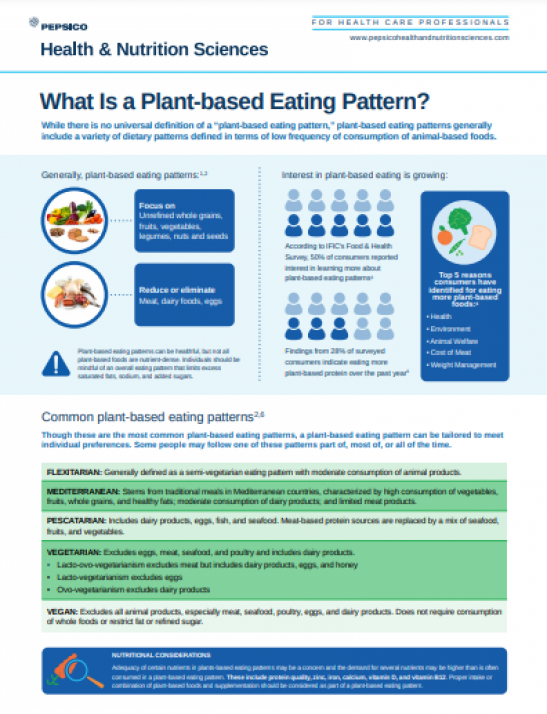What is a Plant-Based Eating Pattern?
Description: Learn about common plant-based eating patterns, nutrition considerations and potential health benefits associated with eating plant-based foods.
- Common plant-based eating patterns
- Potential health benefits associated with eating plant-based foods
What Is a Plant-based Eating Pattern?
While there is no universal definition of a “plant-based eating pattern,” plant-based eating patterns generally include a variety of dietary patterns defined in terms of low frequency of consumption of animal-based foods.
Common plant-based eating pattern examples 2,6
Though these are the most common plant-based eating patterns, a plant-based eating pattern can be tailored to meet individual preferences. Some people may follow one of these patterns part of, most of, or all of the time.
- FLEXITARIAN: Generally defined as a semi-vegetarian eating pattern with moderate consumption of animal products.
- MEDITERRANEAN: Stems from traditional meals in Mediterranean countries, characterized by high consumption of vegetables, fruits, whole grains, and healthy fats; moderate consumption of dairy products; and limited meat products.
- PESCATARIAN: Includes dairy products, eggs, fish, and seafood. Meat-based protein sources are replaced by a mix of seafood, fruits, and vegetables.
- VEGETARIAN: Excludes eggs, meat, seafood, and poultry and includes dairy products. Lacto-ovo-vegetarianism excludes meat but includes dairy products, eggs, and honey. Lacto-vegetarianism excludes eggs. Ovo-vegetarianism excludes dairy products.
- VEGAN: Excludes all animal products, especially meat, seafood, poultry, eggs, and dairy products. Does not require consumption of whole foods or restrict fat or refined sugar.
What are the potential health benefits of eating plant-based foods?
A growing body of research suggests, but does not yet prove, plant-based eating patterns support positive health outcomes. The majority of studies have been conducted with vegan, vegetarian, and Mediterranean dietary patterns. More research is needed to determine the impact of other plant-based eating patterns and to establish causation.
Potential health benefits of eating plant-based foods on Weight Management
- Research suggests plant-based eating patterns may be associated with weight loss, decreased weight gain, and improved body composition, which has been attributed to reduced caloric intake and improved satiety from high consumption of fiber. 7
- A meta-analysis of 12 randomized controlled trials suggests that people following vegetarian diets without energy restriction may lose more weight than non-vegetarian groups. 8 Study participants following the more restrictive vegan diets lost more weight than those following lacto-ovo-vegetarian diets.
Potential health benefits of eating plant-based foods on Type 2 Diabetes
- A prospective cohort study of over 41,000 participants suggests the prevalence of type 2 diabetes may decrease as the amount of animal products consumed in the diet decreases. 9
- Research also suggests plant-based eating patterns may be helpful in diabetes management. In an RCT of 99 individuals with type 2 diabetes, those on a low-fat vegan diet for 22 weeks had greater improvements in glycemic control and decreased use of medication compared to participants on a non-vegan diet plan designed for diabetic patients. 10
Potential health benefits of eating plant-based foods on cardiovascular disease
- The Dietary Approaches to Stop Hypertension (DASH) diet, which is low in animal products, total fat, and saturated fat; and high in fruits and vegetables, may be associated with decreased risk of heart failure in men and women. 11, 12
Potential health benefits of eating plant-based foods on cancer
- Plant-based eating patterns may be associated with decreased incidence of cancer, likely due to the high content of fiber, antioxidants, and other phytochemicals in plant foods, along with reduced intake of fat and other carcinogenic compounds from animal products. 13
- A meta-analysis of 108 studies 14 reported but has not yet proven that a vegetarian diet may lower the incidence from total cancer by 8%, and a vegan diet may show a significant reduced risk of incidence from total cancer of 15%.
Potential health benefits of eating plant-based foods on gut microbiota
- Emerging research suggests that plant-based eating patterns promote the development of a more diverse gut microbial system. 15 More research is needed to establish the link between these changes in the gut microbiota and human health.
- The high fiber content of plant-based eating patterns may help with digestive health. 16
Click the link to the right to download the handout to use with your patients and clients!
References
Storz, MA. Perm J. 2015;23:18–068.
Tuso, PJ et al. Perm J. 2013;17(2):61–66.
International Food Information Council Foundation (IFIC). 2019. https://foodinsight.org/wp-content/uploads/2019/05/IFIC-Foundation-2019-Food-and-Health-Report-FINAL.pdf
Plant-Based Foods Association. SPINS data, 52 weeks ending April 2019
IFIC. 2021. https://foodinsight.org/wp-content/uploads/2020/06/IFIC-Food-and-Health-Survey-2020.pdf
Magkos F et al. Adv Nutr. 2020;11(1):1-9.
Najjar, RS & Feresin, RG. Nutrients. 2019;11(11).
Huang, RY et al. J Gen Intern Med. 2016;31(1):109–116.
Honstad, S et al. Nutr Metab Cardiovasc Dis. 2013;23(4): 292–299.
Barnard, ND et al. Diabetes Care. 2006;29(8):1777–1783.
Levitan, EB et al. Arch Intern Med. 2009a;169(9):851–857.
Levitan, EB et al. Am J Cardiol. 2009b;104(10):1416–1420.
Tantamango-Bartley, Y et al. (2013). Cancer Epidemiol Biomarkers Prev. 2013;22(2):286–294.
Dinu, M et al. Crit Rev in Food Sci Nutr. 2017;57(17):3640– 3649.
Kim, MS et al. Environ Microbiol Rep. 2013;5(5):765– 775. 1
Chassaing, B et al. In Curr Opin Gastroenterol. 2017;33(6):417– 421.
